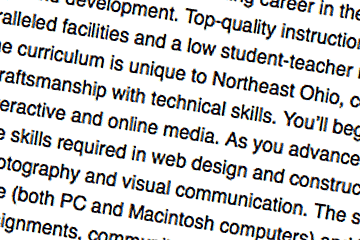Am I uninformed or insane?
 Designer and author Andy Rutledge has an opinion:
Designer and author Andy Rutledge has an opinion:
If you emerge from university today with a web design degree, chances are rather slim that you’re employable as a user experience (UX) or web designer. Maybe you learned a lot of stuff; it’s just probably the wrong stuff.
Congratulations, you’ve been defrauded. Hope it didn’t cost you or your parents too much.
The game changed. Higher education didn’t…and it won’t. In fact, it can’t. Today the appropriate path for UX design education goes around, not through, nearly all universities and colleges. These institutions should be ignored in favor of actually-relevant UX design education options, which most often means self-directed study. If you disagree, as too many do, it likely means you’re either uninformed or insane (as I’ll demonstrate later).
Read full article
Yes, but...
"Today, however, designers work on organizational structure and social problems, on interaction, service, and experience design. Many problems involve complex social and political issues. As a result, designers have become applied behavioral scientists, but they are woefully undereducated for the task."
Read full article
I teach web design at a college. In Andy’s mind I’m not only uninformed and/or insane, but an accessory (or maybe a perpetrator) in ripping off unsuspecting students. Funny thing is, I don’t disagree with many of his point, but I strongly disagree with his conclusion.
There’s no doubt that it’s difficult to change our curriculum as fast as the technology and culture of the web changes. But we try. We frequently revise individual course outlines and in the past two years have done a top to bottom overhaul of our entire Visual Communication & Design curriculum. The process started with a long session with our Advisory Board from the web design community who told us on dozens of Post-It notes, exactly what skills and knowledge they hoped to see in graduates of our program.
In addition to these department-wide changes, individual instructors can and do fine-tune the presentation of course material to keep it up to date. Do they all do it equally well? Probably not. Do they try? Absolutely.
Since I’m probably getting too defensive at this point, let’s just move on to the alternative.
Self-directed study
Mr. Rutledge wrote a follow-up article called Education for Dummies in which he offers his solution for the problem:
...the most respected web designers in the world didn’t go to school for web design or UX design or interactive design. They learned whatever they could in school while figuring out web design’s ever-changing professional and technical skills on their own or with the help of their peers. In many cases, they made it up as they went along!
...
You don’t need an institution in order to learn something. All you need is the desire to learn and the will to see it through.
Read full article
Again, I don’t disagree, at least not totally. If you are that motivated, self-directed learner, go for it! I tell my students the same thing. But not everyone is. Some people need structure, direction, encouragement and support. Exactly what a good teacher can provide.
Some people prefer or need a class environment where outside distractions are limited and necessary resources are provided (computers, software, etc.). Since we are social animals, many of us learning with a group of like-minded individuals.
People skills
And then there’s the critical skill that nearly every employer I’ve talked with mentions: the ability to collaborate, to work effectively with a team. Sitting at home in front of your computer may be a good way to learn web design, but it’s hard to learn to work with people without, well, working with people.
There’s more I’d like to say about this, but now I’m interested in what you think:
- Have you had a good or bad experience learning web design at a college or university?
- How did you learn web design?
- Would you recommend the same approach to others?
- Am I uninformed, insane, or both?
Click on "![]() Comments" below to add yours.
Comments" below to add yours.
Related articles
Advice to an "A" student—Nov. 5, 2010
Dream curriculum—Aug. 14, 2010
